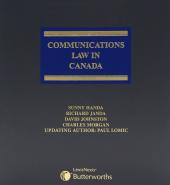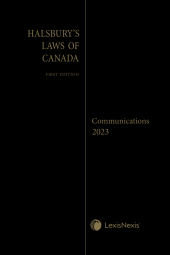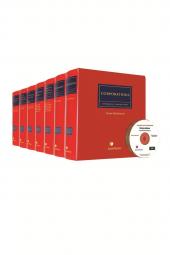Communications Law in Canada
**This title is Print on Demand – please expect a potential delay in processing and shipping.**
Examines the legal frameworks under communication law currently employed to regulate traditional forms of both telecommunications and broadcasting.One Year Subscription Only Terms
Subscribers receive the product(s) listed on the Order Form and any Updates made available during the annual subscription period. Shipping and handling fees are not included in the annual price.
Subscribers are advised of the number of Updates that were made to the particular publication the prior year. The number of Updates may vary due to developments in the law and other publishing issues, but subscribers may use this as a rough estimate of future shipments. Subscribers may call Customer Support at 800-833-9844 for additional information.
Subscribers may cancel this subscription by: calling Customer Support at 800-833-9844; emailing customer.support@lexisnexis.com; or returning the invoice marked 'CANCEL'.
If subscribers cancel within 30 days after the product is ordered or received and return the product at their expense, then they will receive a full credit of the price for the annual subscription.
If subscribers cancel between 31 and 60 days after the invoice date and return the product at their expense, then they will receive a 5/6th credit of the price for the annual subscription. No credit will be given for cancellations more than 60 days after the invoice date. To receive any credit, subscriber must return all product(s) shipped during the year at their expense within the applicable cancellation period listed above.
Product description
Examines the legal frameworks under communication law currently employed to regulate traditional forms of both telecommunications and broadcasting. It also explores how the dramatic evolution of convergence technologies in the context of an extremely competitive business environment has forced a re-evaluation of the regulation of communications.
The four "Cs" of communications law are all covered:
- Carriage - the legislative and institutional mechanisms of regulation and control - including an examination of the Canadian Radio-Television and Telecommunications Commission Act, the Radiocommunication Act and the Telecommunications Act. Foreign ownership/control restrictions, private sector participation and the role of competition are among the topics addressed
- Content - in addition to the legal regulatory framework, Canada's public service and cultural policy are also addressed both historically and in today's era of globalization and deregulation. Selected CRTC regulations and licensing decisions are discussed
- Convergence - recent developments in business, technological and legal/regulatory frameworks are addressed as are substantive and enforcement issues
- Competition - applicable domestic competition law principles and transnational competition law issues
The full text of relevant legislation, regulations and treaties is also included.
Billing Method: Updates Billed As Issued
Table of contents
Chapter 1: Introduction
Chapter 2: The Carriage Business and the Trends Towards Liberalization and De-Regulation
Chapter 3: The Legal and Institutional Framework for Carriage Regulation
Chapter 4: The Operational Approach to Carriage Regulation
Chapter 5: Introduction to Content Regulation
Chapter 6: The Policy Framework: Public Service and Cultural Sovereignty
Chapter 7: The Regulatory Framework
Chapter 8: Implementation of Content Regulation
Chapter 9: Introduction to Convergence
Chapter 10: Convergence Technologies
Chapter 11: The Internet
Chapter 12: Legal/Regulatory Convergence
Chapter 13: Other Legal Issues in an Era of Convergence
Chapter 14: Business Convergence
Chapter 15: Competition Law
Appendix
 Lexis Nexis
Lexis Nexis 


